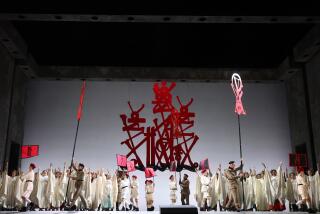In Shanghai, Arts Festival Relies on Pomp, Pageantry
- Share via
SHANGHAI — When it comes to performance art in Shanghai, size is everything.
Consider the raw numbers at the second annual International Arts Festival going on throughout this month: more than 5,000 performers from 19 countries running 54 programs at 17 venues.
The extravaganza of Italian opera, Israeli modern dance, Spanish flamenco, Australian theater, Russian circus and Vietnam water puppetry is meant to showcase the port city as more than China’s commercial nerve center. It also wants to be the nation’s cultural mecca.
Never mind that the scale and presentation often feel more like a Chinese parade with Las Vegas characteristics.
Take the crown jewel of the festivities: Giuseppe Verdi’s “Aida,” a romantic tragedy involving an Egyptian army captain and a slave girl. Performed at the colossal Shanghai Stadium for an audience of 45,000 early this month, the opera was billed one of the most extravagant versions ever staged. Stealing the show was a chorus of acrobats, fire-eaters, horse-drawn chariots, a dancing elephant, symphonic fireworks and a 100-foot-tall golden pyramid.
At the evening’s climax, about 2,000 extras dressed as Egyptian soldiers charged into the moonlit stadium to the famous victory march, turning the modern ballpark into an ancient battlefield. The players were members of the People’s Liberation Army, who during rehearsals had worn their regular green military uniforms.
Shanghai officials love to brag about the Olympic scale and international dimension of their “Aida.” It symbolizes to them the city’s rising stature as a world-class metropolis.
But skeptics maintain the heavily subsidized arts festival says more about the city’s vanity than its growing appreciation for the arts. It is in keeping with Shanghai’s desire to build the hardware of culture, erecting the country’s fanciest opera house and modern museum and filling them with the works of international artists. But it goes no further in nurturing home-grown talents that could turn Shanghai into an artistic hub to rival Beijing.
Wang Xuefeng, an interior designer and opera lover, said she was amazed to see so many grandparents and grandchildren in the audience who were clearly seduced by the grand opera’s unabashed circus-like atmosphere.
“Most people were not there to see the art,” Wang said. “They don’t really understand what’s going on onstage, and they were talking to each other nonstop.”
In fact, there was scant applause after the dramatic arias by Russian soprano Olga Roanko and Italian tenor Lando Bartolini. But when the elephant stood on its hind legs and waved, the stadium roared with applause. And when a horse refused to get offstage and finally galloped away, the audience again exploded in cheers.
Many came from out of town and were attending their first Western opera, expecting to see the biggest and most lavish “Aida” ever staged. But they treated the event much like a typical Chinese opera, openly chowing down on hamburgers, sunflower seeds and roasted chestnuts.
But the eye candies onstage were much harder to digest. The sheer size of the stadium made it difficult to hear and see, despite the rock concert-like amplifiers and video screens. Those who could catch a better view through binoculars gossiped with their neighbors about the generous bodies of the divas. They are not used to seeing a discrepancy between the romantic leads’ artistic ideal and physical reality.
When Aida and Radames, the lead characters, died for the sake of love, the crowd was not sure how to react. The director appealed to the Chinese cultural sensibility by releasing golden butterflies into the sky, which symbolizes life after death and echoes the tale of China’s own fabled equivalent of Romeo and Juliet.
Before some in the audience could complain about the somewhat anticlimactic ending, a fresh set of fireworks lighted up the stadium, and the mob of People’s Liberation Army soldiers and zoo animals reemerged to lift the crowd’s spirit.
“It’s important for Shanghai to do this; it’s the same reason they want to build the tallest building in the world,” said Michael Qi, a local lawyer.
More to Read
The biggest entertainment stories
Get our big stories about Hollywood, film, television, music, arts, culture and more right in your inbox as soon as they publish.
You may occasionally receive promotional content from the Los Angeles Times.










